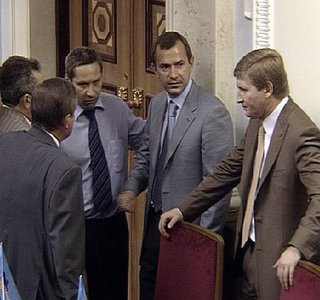Problems surrounding this winter's massive increases in communal housing and services charges have now developed into a full-blown crisis for the government. Unofficial figures reveal that a majority of citizens have delayed their payments to their local councils, and now the VR being blockaded for a second day by opposition deputies demanding a debate on this subject.
Yanukovych and the anti-crisisites have tried to defuse the crisis by proposing the formation of a working group to check if the increases are justified, and are blaming oblast councils, most of which have an 'orange' ruling majority, for the increases.
In Kyiv, BYuT have
succeeded in their local campaign to ensure the proposed draconian tariff increases be rescinded, and have no doubt earned many political 'brownie points'.
Now an
article in today's big-selling, normally PoR-leaning 'Donbass' newspaper throws down a challenge to the anti-crisisites.
I've loosely translated portions:
"Kiev has decreased its tariffs, now what about the regions?Thursday 8th February was a good day for millions of inhabitants of the Ukrainian capital. For the first time, in the largest city of our country, tariffs were reduced. Credit for this belongs to the BYuT-organized campaign, which even the pro-authority fractions were forced to support in the local council. The experience of Kyiv is of interest to the majority of large industrial centres, having similar problems with payment for public services, whose costs have recently rose dramatically by three or four times. Strictly speaking, there are no economic reasons for this increase, which the special commission created at the initiative of Yulia Timoshenko's block, could convincingly prove.
The chairman of commission Aleksandr Klyus (BYuT) declared that tariff increases in Kyiv were not only economically without foundation, but were also illegal, since the capital's authorities was obliged to register them with the Justice Department. From the first days of December the mayor of Kyiv had received repeated warnings from the prosecutor's office that the city authority were not adhering to procedure by increasing the tariffs. Simultaneously the opposition called upon Kyivites to on no account pay the new tariffs. A payment strike was called and the inhabitants of Kyiv refused to pay not only the new, but also at the old tariffs, waiting to see what the final charges would be.
On 8 February the united pressure of opposition, prosecutor' office and millions of townspeople who objected to pay the ridiculous charges, produced a result - 113 deputies of the KyivRada (including even the mayor's fraction) voted for a two-fold decrease in the proposed tariffs. As a result, Kyiv's tariffs became almost the lowest in the country.
However, Kyiv is not not the only case where it has been possible to overcome the baseless tariff increases and to restrain the greediness of those who raised them. The same has happened in the small town of Bliznyuki in the Kharkiv region. The almost completely agrarian nature of this area precludes the possibility of large inflows into the local budget. Nevertheless, in first year of activity the mayor of the town, Gennadiy Korol restored the central water supply, is repairing roads, and has even managed to turned on the street lighting which has been out of action since 1995. In not even a full year of activity the mayor conducted 20 gatherings of the inhabitants of settlement.
In contrast to other places, tariffs in Bliznyuki have not been raised by one kopeck. Money for the urban budget has been raised, according to the mayor, by staging open auctions for the sale of land and previously neglected municipal property. The city authority conducted meetings of urban 'mikrorayony' almost in each building. Inhabitants began to pay directly the charges for financing public utilities and amenities, thanks to which the quality of services, and control by users immediately were improved.
Significantly, the mayor Bliznyukov was elected with the support to the opposition, Yuliya Timoshenko's block. But those who always protect any actions of authority could say, in such a small town, or in the capital, the tariff increases can be challenged, but in medium-sized towns, where most people live, it's more difficult.
Aleksandr Mazurchak, Kamyanets-Podolskiy [Khmel'nitskiy region] city head would not agree. He described the striking results of his authority's activity when he addressed the BYuT forum of local council deputies recently.
The authorities in this 100,000 population city made an inventory of its property and land. As in Bliznyuki, all land sales e.g. for commercial centers, took place in the open, on the competitive basis, making possible large incomes into the urban treasury. [Some details are provided]
Thus, in million+ city of Kyiv, in a hundred-thousand population city, and in the small town, in the center, in the east and West of the country, the opposition has managed to constrain the appetites of those who attempt to tear out a tripling of prices from the pockets of fellow citizens.
What's going on in your city, dear reader?"
LEvko says there are big probs with crumbling khrushchovka apartment blocks all over Ukraine - there are no easy fixes, particularly were town councils are so corrupt. Resident's associations sound like a good idea.
 It looks as if the criminal case against former governor of the Donetsk and then Sumy oblasts, Volodymyr Shcherban [see photo] will be closed. It could be said this man represents the worst aspects of the first 15 years of independent Ukraine - I've posted about his grim past previously.
It looks as if the criminal case against former governor of the Donetsk and then Sumy oblasts, Volodymyr Shcherban [see photo] will be closed. It could be said this man represents the worst aspects of the first 15 years of independent Ukraine - I've posted about his grim past previously.



